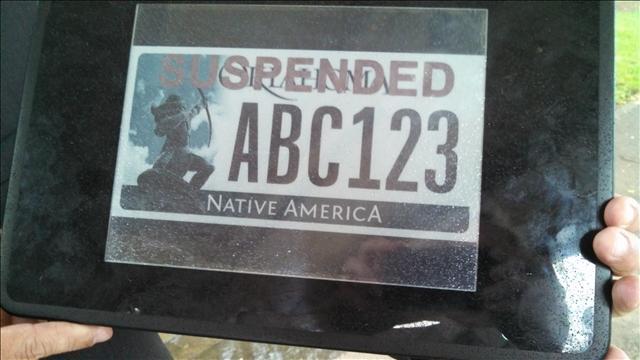
Detailed recently by South Carolina CBS news affiliate WSPA, lawmakers within the state of South Carolina are considering a proposed pilot program that would shift traditional, metal license plates to electronic versions that use an e-paper display similar to the Amazon Kindle. Rather than drawing power from the car, the e-paper display would draw energy from the solar film covering the plate or through energy generated as the car is vibrating. Developed by a company called Compliance Innovations, the plate wouldn’t need a constant source of power, only enough power to change the display if there’s an issue with the driver.

Detailed within the proposal, the advanced plates would be linked electronically to the Department of Motor Vehicles. If a driver has allowed their auto insurance to lapse, the license of the driver has been suspended or the registration has expired, the DMV would automatically send a signal to the plate would would trigger the work “UNINSURED,” “SUSPENDED” or “EXPIRED” in large bold letters across the plate. One helpful advantage to the electronic tag is that drivers wouldn’t have to place a sticker on their tag when paying for a new year of registration. The DMV would simply send a signal to the tag to update the listed year.
According to the development team, the large text could flash on the plate and be displayed in a bright red color to draw attention to the vehicle. Beyond legal trouble with driving status, this type of messaging could also be helpful to the police. Any car that’s registered as stolen could display the word “STOLEN” in large, flashing letters on the electronic plate. If a plate has been identified in a case involving a missing child, an electronic plate could display the phrase “AMBER ALERT” in order to bring more attention to the vehicle.
Compliance Innovations specifically mentioned it would require three court orders to get access to the location of a car in question. Regarding location security, co-founder Brian Bannister said “No one entity could actually track an individual vehicle. It would require three court orders: to the DMV; to us; and the (cellular) carrier themselves to actually be able to locate a vehicle.”
One roadblock to mass adoption of the e-paper technology is the high cost of the electronic plates. While the company is attempting to bring down the cost below $100 per plate, the average cost for a standard metal plate is less than $10 a plate. However, the state of South Carolina loses approximately $150 million per year on drivers that continue driving with expired tags or without an auto insurance policy. Hypothetically, if the number of uninsured drivers drops within the state, monthly insurance rates would fall and a portion of the plate’s cost could be passed onto the driver in the form of a yearly lease fee.


